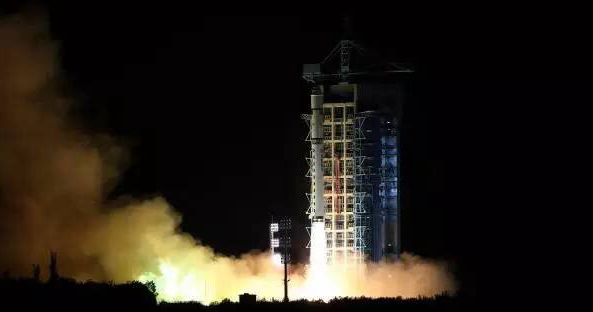China launches the world's first quantum satellite on top of a Long March-2D rocket from the Jiuquan Satellite Launch Center in Jiuquan, northwest China's Gansu Province, Aug. 16, 2016. The world's first quantum communication satellite, which China is preparing to launch, has been given the moniker "Micius," after a fifth century B.C. Chinese scientist, the Chinese Academy of Sciences (CAS) announced Monday. (Xinhua/Jin Liwang)

China successfully launched the world's first quantum satellite from the Jiuquan Satellite Launch Center in northwestern Gobi Desert at 1:40 a.m. on Tuesday.
In a cloud of thick smoke, the satellite, Quantum Experiments at Space Scale (QUESS), roared into the dark sky on top of a Long March-2D rocket.
The 600-plus-kilogram satellite will circle the Earth once every 90 minutes after it enters a sun-synchronous orbit at an altitude of 500 kilometers.
It is nicknamed "Micius," after a fifth century B.C. Chinese philosopher and scientist who has been credited as the first one in human history conducting optical experiments.
In its two-year mission, QUESS is designed to establish "hack-proof" quantum communications by transmitting uncrackable keys from space to the ground, and provide insights into the strangest phenomenon in quantum physics -- quantum entanglement.
Quantum communication boasts ultra-high security as a quantum photon can neither be separated nor duplicated. It is hence impossible to wiretap, intercept or crack the information transmitted through it.
With the help of the new satellite, scientists will be able to test quantum key distribution between the satellite and ground stations, and conduct secure quantum communications between Beijing and Xinjiang's Urumqi.
QUESS, as planned, will also beam entangled photons to two earth stations, 1,200 kilometers apart, in a move to test quantum entanglement over a greater distance, as well as test quantum teleportation between a ground station in Ali, Tibet, and itself.
"The newly-launched satellite marks a transition in China's role -- from a follower in classic information technology (IT) development to one of the leaders guiding future IT achievements," said Pan Jianwei, chief scientist of QUESS project with the Chinese Academy of Sciences (CAS).
The scientists now are expecting quantum communications to fundamentally change human development in the next two or three decades, as there are enormous prospects for applying the new generation of communication in fields like defense, military and finance.
China launches the world's first quantum satellite on top of a Long March-2D rocket from the Jiuquan Satellite Launch Center in Jiuquan, northwest China's Gansu Province, Aug. 16, 2016. The world's first quantum communication satellite, which China is preparing to launch, has been given the moniker "Micius," after a fifth century B.C. Chinese scientist, the Chinese Academy of Sciences (CAS) announced Monday. (Xinhua/Jin Liwang)

